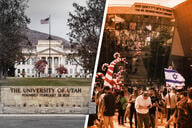You have /5 articles left.
Sign up for a free account or log in.
Two weeks ago, during a Harvard Law School panel discussion, a student asked Israeli politician and former foreign minister Tzipi Livni why she was so “smelly.”
Many immediately condemned the question as inappropriate and anti-Semitic, and others rose to the student’s defense. Eventually he apologized, but debate has continued and expanded beyond the inciting question to issues of free speech and censorship.
The law school’s Program on Negotiation, which sponsored the event, “The Israeli-Palestinian Conflict and the U.S.,” featuring Livni, uploaded video of the panel but edited out the student’s question. Criticism turned from the student to the law school itself.
That decision “bodes poorly on our institution, and demands an explanation or justification,” said one student in a letter to the editor in The Harvard Law Record, the law school's independent student newspaper. “The packed event was clearly public and clearly recorded. Harvard Law is sending a message that censorship may be appropriate if comments are embarrassing or offensive -- a dangerous precedent and a signal that Harvard does not trust us to take responsibility for our own actions.”
Michelle Deakin, a spokeswoman for the law school, noted that the question had been reported verbatim by others, including Martha Minow, the school’s dean. And, she said, “the Program on Negotiation publishes video of its academic events in order to share substantive ideas and intellectual content. Administrators in PON removed the offensive comment so as not to detract from that goal.”
In full, the student, Husam El-Qoulaq, said, “My question is for Tzipi Livni -- how is it that you are so smelly?” He added, “It’s regarding your odor -- about the odor of Tzipi Livni, very smelly.”
Minow also condemned the question in a letter to campus. “The comment was offensive and it violated the trust and respect we expect in our community,” she wrote. “Many perceive it as anti-Semitic, and no one would see it as appropriate. It was an embarrassment to this institution and an assault upon the values we seek to uphold. The fact that speech is and should be free does not mean that hateful remarks should go unacknowledged or unanswered in a community dedicated to thoughtful discussion of complex issues and questions.”
Deakin declined to comment on whether disciplinary action would be taken, as many say it ought to be.
Some, but not all, interpreted the comment as anti-Semitic. Student leaders of the Jewish Law Students Association said in their own letter that it invoked a centuries-old stereotype “of ‘the Jew’ as ‘smelly’ or ‘dirty’” and that “Nazis promoted the idea that Jews ‘smell’ to propagandize Jews as an inferior people.”
Others, including some Jewish students, said they didn’t read it that way, and El-Qoulaq himself said in an apology that he wasn’t aware of that history. “I want to be very clear that it was never my intention to invoke a hateful stereotype,” he wrote. “But I recognize now that, regardless of my intention, words have power, and it troubles me deeply to know that I have caused some members of the Jewish community such pain with my words … had I known it was even possible that some listeners might interpret my comments as anti-Semitic, there is absolutely no chance that I would have uttered them.”
A push for some kind of punishment continues, even among those who aren’t convinced the comment was anti-Semitic.
“The question was offensive. Period,” wrote one alum in another letter to the editor suggesting El-Qoulaq ought not to be allowed to attend commencement. “Letting the matter go on the basis of the questioner’s ‘I’m sorry if I offended anyone, I didn’t know any better’ nonapologetic ‘apology’ is not nearly adequate.”
Others have stood behind El-Qoulaq, saying he experiments with various ways to engage others on this issue, some more substantive than others. “Effective protest should sometimes make us uncomfortable and even be disrespectful,” several students wrote in another letter. “But it should not, even inadvertently, remind its listeners of anti-Semitic tropes. That is why Husam has apologized, for which we applaud him.”
On top of the criticism leveled at the university and at El-Qoulaq himself, many also chided the student-run paper that published those letters for initially opting not to publish El-Qoulaq’s name even if it was widely known at the law school. It did so eventually, after his name had been published elsewhere and with his permission, but not before attracting a barrage of criticism just weeks after also taking flack for refusing to publish a series of videos.
Before El-Qoulaq’s question, Harvard Law School was roiled by another, separate free speech debate. Students were putting up signs critical of protesters on campus, and those protesters were taking them down. That sparked its own free speech argument, but The Harvard Law Record’s editor-in-chief, Michael Shammas, also opted not to publish videos of students removing posters, he explained at the time, out of “consideration for our fellow students.”
“We are all imperfect; we all make mistakes, say things we don’t necessarily intend, and get frustrated. Moments of passion, filmed without the consent of a given student, under circumstances thrust upon them, should not be preserved for all time,” he wrote in a note explaining the decision, which many disliked.
In a similar vein, the paper noted several times that it withheld El-Qoulaq’s name “in the interests of furthering respectful discourse.”
Minow, in a statement at the time, reaffirmed the school's commitment to freedom of expression, citing a rule prohibiting defacing signs, and she pledged to provide a central space with its own guidelines for students to exchange views.
“In shared spaces, all students must be able to voice their opinions and express their dissent equally,” she said.




